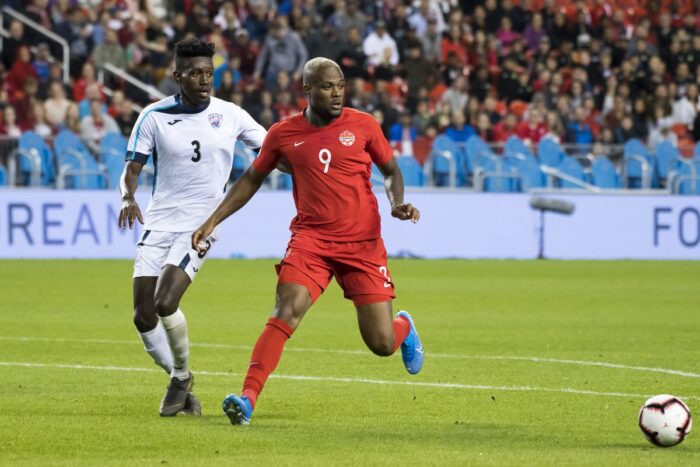Of all the stories ahead of the ever-controversial 2024 World Cup in Qatar, the potential qualification of Canada for the tournament is likely to be small fry.
However, for a country that hasn’t qualified for soccer’s showpiece occasion since 1986, and where the sport is growing in popularity at an incredible rate, qualification would be a tremendous boost.
Happily, the Canucks, as they are known, are going about their business in fine fashion. After eight rounds of matches in the CONCACAF qualifying campaign, Canada lead the standings from USA and Mexico. While they have more away games left to play than home outings, just a couple more wins will secure the Canadians their first World Cup berth in 36 years.
Some 44,000 people crammed into the Commonwealth Stadium in Edmonton to witness the Canucks’ 2-1 win over Mexico in November, and that crowd is reflective of the mood in the Alberta capital.
Home to the largest shopping mall in North America, Edmonton also plays host to River Valley Parks – 20 times the size of Central Park in New York – and the Elk Island National Park – home to the largest land mammal on the continent, the wood bison. The city is also home to one of the biggest concentrations of casino resorts in Canada, which has also seen an explosion in the popularity of online gambling. Casino review sites like playcasinos.ca recommend the best sites where players can enjoy a variety of slots and table games, while depositing and withdrawing funds in a variety of different ways.
Everything just seems to be bigger in Edmonton, and if this is where the Canadian Soccer Association intends to set up home here, then the sport can only benefit as it enters a bold new era of success.
Friends in high places

Source: cbc.ca
From Craig Forrest to Frank Yallop, Canadian soccer has produced players who have gone on to play at the highest level from time to time, but this generation of stars is collectively taking the game to new heights in the country.
In Alphonso Davies, they have a world-renowned and world-class talent in their midst. Raised in Edmonton, the speedy winger joined the Vancouver Whitecaps as a 16-year-old in 2016, and he made his first-team debut just a matter of months later.
His electric performances on the left flank, which saw him included in the MLS All-Star game of 2018, earned Davies a $22m transfer to perennial German champions Bayern Munich.
Many wondered if the teen would make the grade in Germany, but they would be eating their words pretty quickly. He scored his first goal for the club in that 2018/19 season, and by the time 2019/20 came around, Davies was a regular starter in the team, having been retrained as a wing-back.
In that fateful campaign, Bayern won the Bundesliga title and the Champions League – Davies being the first Canadian to earn a winner’s medal in the competition.
Davies is a bona fide global star of football, and more Canadians are heading in that direction. Jonathan David was a key figure in the Lille squad that won the French Ligue 1 title in 2024/21, Milan Borjan is a regular in the Champions League and Europa League with Red Star Belgrade, and Cyle Larin is still hammering in the goals for Turkish team Beşiktaş.
Add to those global stars a handful of MLS stalwarts such as Lucas Cavallini, Jonathan Osorio and Samuel Piette, and you have a recipe for a really strong roster.
It is still something of a surprise that the Canadians are outperforming USA and Mexico in CONCACAF sectional qualifying for the World Cup, but it’s a testament to how far these players have come in the past couple of years or so.
Going for gold

Source: canadasoccer.com
While Canadian soccer has been bubbling under the surface nicely for the past couple of years, it was at the CONCACAF Gold Cup in the summer that John Herdman’s team finally showed their class on the big stage.
They defeated Martinique and Haiti in their opening two games with consummate ease, as expected, and it was in their next outing that the Canadians really shone. Taking on USA, who have tended to have the edge over the years in the North American rivalry, Canada produced an excellent performance and were unlucky to lose to a goal scored in the first 60 seconds of the game.
Nevertheless, they advanced to the knockout stage, and in the quarter-finals, they defeated Costa Rica – a team that had competed at the World Cup just three years prior.
The semi-final against Mexico was a massive occasion, with 70,304 people piling into the NRG Stadium in Houston to watch the action. The nip-and-tuck contest came alive in the second period, with Tajon Buchanan cancelling out Orbelín Pineda’s opener for the Mexicans.
The game looked to be heading for extra time, but then Héctor Herrera stepped up to notch a heart-breaking winner for Mexico in the ninth minute of added time.
On another day, Canada might have reached their first Gold Cup final since the turn of the new millennium, but even so, they have taken the lessons of that campaign and put them to good use in World Cup qualification.

Source: wakingthered.com
Draws with Honduras and USA in their opening qualifiers – Larin netting in both – were followed by a handsome 3-0 win over El Salvador, and a revenge mission in Mexico City saw the Canadians bring home a creditable 1-1 draw.
Stalemate with Jamaica was followed by resounding successes over Panama and Costa Rica, and any doubts that Canada were ready for the top tier were eschewed on November 16 – Larin’s brace carrying the Canucks to a 2-1 victory over Mexico in Edmonton.
If the Canadians can win two of their next three games against Honduras, USA and El Salvador, then they will almost be able to book their flights to Qatar in a year’s time.
It’s a measure of the quality and the confidence of Canadian soccer that only the most pessimistic of individuals would bet against them achieving exactly that.
